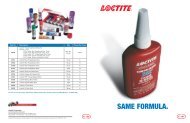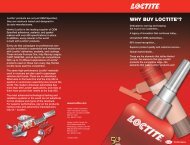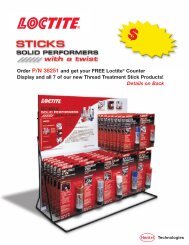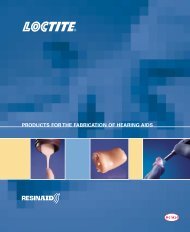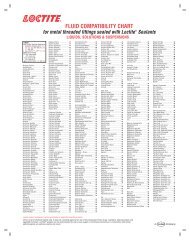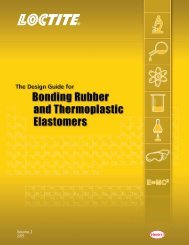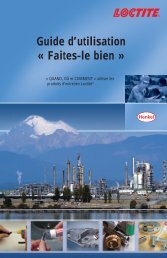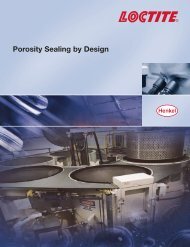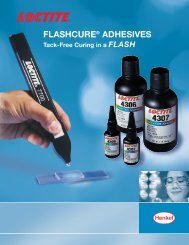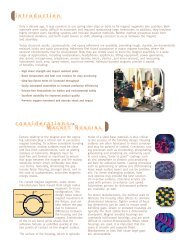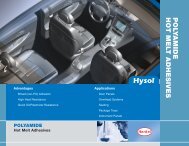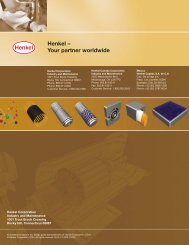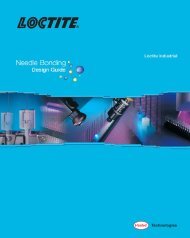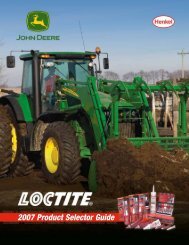Liquid Crystal Polymer (LCP)ThermoplasticTrade Names• Granlar• HX Series• Vectra• XydarManufacturerGranmont Inc.E.I. DuPontHoescht CelaneseAmoco Performance ProductsGeneral DescriptionLiquid crystal polymers (LCP), properly called wholly aromaticcopolyesters, can be based on tere<strong>ph</strong>thalic acid, p,p-dihydroxybi<strong>ph</strong>enyl,and p-hydroxybenzoic acid. The compounds react to form tightlypacked, rigid polymer chains consisting of long, flat monomeric units.LCP’s resistance to weathering, radiation, burning, and almost allchemicals, as well as its outstanding strength at extreme temperatures,makes it a suitable replacement for most other engineering materials,including metals and ceramics. Specialty grades available include glass,carbon, and mineral filled, as well as wear resistant, colored, andalloyed. In 2004, the price of LCP ranged approximately from $8.00 to$12.00 per pound at truckload quantities.General PropertiesLCP has outstanding mechanical properties at both ambient andextreme temperatures. For example, LCP can have a tensile modulusas high as 1.20x10 6 psi (8.4x10 4 kg/cm 2 ) at 575°F (308°C), whichexceeds that of most other engineering thermoplastics at roomtemperature. Grades of LCP have tensile strengths in excess of20,000 psi (1400 kg/cm 2 ), a compressive strength of more than 6,000psi (422 kg/cm 2 ), and its mechanical properties improve at subzerotemperatures. LCP is resistant to virtually all chemicals, includingacids, organic hydrocarbons, and boiling water. It is attacked byconcentrated, boiling caustics but is unaffected by milder solutions.LCP is also unaffected by ionizing and Cobalt 60 radiation up to 10billion rads, it withstands high levels of UV radiation, and istransparent to microwaves. It is an electrical insulator with good arcresistance, is UL rated for continuous electrical service at 464°F(240°C), and can be used for applications with intermittenttemperatures up to 600°F (316°C). LCP is inherently flame resistant,rated UL94 V-0, and will not sustain combustion. It has remarkablethermal oxidative stability with a decomposition temperature ofgreater than 1000°F (550°C) in air.Typical Properties of Liquid Crystal Polymer (LCP)American EngineeringProcessing Temperature 500°F to 700°F 260°C to 371°CLinear Mold Shrinkage 0.001 to 0.002 in./in. 0.001 to 0.002 cm/cmMelting Point 530°F to 670°F 277°C to 354°CDensity 93.0 to 111.7 lb./ft. 3 1.49 to 1.79 g/cm 3Tensile Strength, Yield 21.5 to 30.0 lb./in. 2 x 10 3 15.1 to 21.1 kg/cm 2 x 10 2Tensile Strength, Break 9.0 to 30.0 lb./in. 2 x 10 3 6.3 to 21.1 kg/cm 2 x 10 2Elongation, Break 1.0 to 3.0% 1.0 to 3.0%Tensile Modulus 14.6 to 32.0 lb./in. 2 x 10 5 10.3 to 22.5 kg/cm 2 x 10 4Flexural Strength, Yield 13.7 to 27.0 lb./in. 2 x 10 3 9.6 to 26.0 kg/cm 2 x 10 2Flexural Modulus 13.9 to 23.2 lb./in. 2 x 10 5 9.8 to 16.3 kg/cm 2 x 10 4Compressive Strength 6.5 to 11.6 lb./in. 2 x 10 3 4.6 to 8.2 kg/cm 2 x 10 2Izod Notched, R.T. 0.7 to 3.1 ft.-lb./in. 3.8 to 16.7 kg cm/cmHardness R95 - R110 Rockwell R95 - R110 RockwellThermal Conductivity 0.9 to 3.1 BTU-in./hr.-ft. 2 -°F 0.13 to 0.45 W/m-°KLinear ThermalExpansionDeflection Temperature@ 264 psiDeflection Temperature@ 66 psiContinuousService Temperature0.1 to 1.5 in./in.-°F x 10 -5 0.2 to 2.7 cm/cm-°C x10 -5350°F to 660°F 170°C to 349°CTypical Applications• Electrical – Stator insulation, rotors, boards for motors,burn-in sockets, interface connectors• Heavy Industry – Chemical process and oil field equipmentSI– –– –Dielectric Strength 550 to 900 V/10 -3 in 2.2 to 3.5 V/mm x 10 4Dielectric Constant@ 1 MHzDissipation Factor@ 1 MHzWater Absorption,24 hr.3.1 to 4.3 3.1 to 4.30.020 to 0.030 0.020 to 0.0300.01 to 0.10% 0.01 to 0.10%32The <strong>Loctite</strong> ® Design Guide for Bonding Plastics, <strong>Volume</strong> 4
ADHESIVE SHEAR STRENGTH(psi)(MPa)Liquid Crystal Polymer (LCP)G-54040% Glass Reinforced58 rmsG-540 ROUGHENED63 rmsG-593030% Glass Reinforced106 rmsG-930 ROUGHENED113 rmsXydar courtesy of Amoco Performance Products<strong>Loctite</strong> ® 380 Black Max ® Instant Adhesive,Rubber Toughened<strong>Loctite</strong> ® 401 Prism ® Instant Adhesive,Surface InsensitiveMEDICAL: <strong>Loctite</strong> ® 4011 Prism ®Instant Adhesive, Surface Insensitive<strong>Loctite</strong> ® 401 Prism ®<strong>Loctite</strong> ® 770 Prism ® PrimerMEDICAL: <strong>Loctite</strong> ® 4011 Prism ® /<strong>Loctite</strong> ® 7701 Prism ® Primer<strong>Loctite</strong> ® 414 Super Bonder ®Instant Adhesive, General Purpose<strong>Loctite</strong> ® 330 Depend ® Adhesive,Two-Part No-Mix Acrylic<strong>Loctite</strong> ® 3105 Light Cure Adhesive,MEDICAL: <strong>Loctite</strong> ® 3311 Light Cure Adhesive5003.53002.14002.83502.44503.16504.510507.211007.610507.211007.611507.96504.53502.43002.15003.53502.45003.55003.512008.3145010.0155010.712508.69006.25003.5<strong>Loctite</strong> ® 3340 Light Cure Adhesive,UV Cationic Epoxy<strong>Loctite</strong> ® 4305 Flashcure ® Light Cure AdhesiveFLUORESCENT: <strong>Loctite</strong> ® 4307 Flashcure ®Light Cure Adhesive<strong>Loctite</strong> ® H3000 Speedbonder Structural Adhesive, General Purpose<strong>Loctite</strong> ® H4500 Speedbonder Structural Adhesive, Metal Bonder<strong>Loctite</strong> ® 3030 Adhesive, Polyolefin Bonder<strong>Loctite</strong> ® E-00CL Hysol ® Epoxy Adhesive,Low Odor1501.07505.25003.55503.84503.16004.1Adhesive Performance<strong>Loctite</strong> ® E-30CL , E-20HP and E-214HP Hysol ® Epoxy Adhesives and <strong>Loctite</strong> ® Fixmaster ® HighPerformance Epoxy all achieved good bond strength on the unfilled LCP resin. All other adhesivesachieved moderate to poor bond strengths on LCP.Surface TreatmentsSurface roughening caused a large, statistically significant increase in the bond strengths achieved onLCP for all the adhesives evaluated, except <strong>Loctite</strong> ® 3105 and 3311 Light Cure Adhesives, for whichsurface roughening had no statistically significant effect. Although the process of surface roughening didnot result in a significant increase in the surface roughness of the LCP, it removed a surface layer, whichVectra L140D-2 produced by Ticona 111 rms<strong>Loctite</strong> ® E-90FL Hysol ® Epoxy Adhesive,Flexible<strong>Loctite</strong> ® E-30CL Hysol ® Epoxy Adhesive,Glass BonderMEDICAL: <strong>Loctite</strong> ® M-31CL Hysol ®Epoxy Adhesive, Glass Bonder<strong>Loctite</strong> ® E-20HP Hysol ® Epoxy Adhesive,Fast SettingMEDICAL: <strong>Loctite</strong> ® M-21HP Hysol ®Epoxy Adhesive, Fast Setting<strong>Loctite</strong> ® E-214HP Hysol ® Epoxy Adhesive,High Strength<strong>Loctite</strong> ® Fixmaster ® High Performance Epoxy<strong>Loctite</strong> ® 1942 Hysol ® Hot Melt Adhesive,EVA Based5503.810006.99006.2210014.510507.21000.7resulted in higher bond strengths. The use of <strong>Loctite</strong> ® 770 Prism ® Primer, in conjunction with <strong>Loctite</strong> ®401 Prism ® Instant Adhesive, or <strong>Loctite</strong> ® 4011 Prism ® Medical Device Instant Adhesive with <strong>Loctite</strong> ®7701 Prism ® Primer, resulted in no statistically significant change in the bondability of LCP.Other Important Information• LCP is compatible with all <strong>Loctite</strong> ® brand adhesives, sealants, primers, and activators.• Surface cleaners: isopropyl alcohol, <strong>Loctite</strong> ® ODC-Free Cleaner & Degreaser.<strong>Loctite</strong> ® 3651 Hysol ® Hot Melt Adhesive,Polyolefin1501.0<strong>Loctite</strong> ® 7804 Hysol ® Hot Melt Adhesive1000.7<strong>Loctite</strong> ® 3631 Hysol ® Hot Melt Adhesive,Urethane3502.4<strong>Loctite</strong> ® U-05FL Hysol ® Urethane Adhesive,High Strength<strong>Loctite</strong> ® Fixmaster ® Rapid Rubber RepairOEM: <strong>Loctite</strong> ® U-04FL Hysol ®Urethane Adhesive, Fast Setting<strong>Loctite</strong> ® 5900 ® Flange Sealant,Heavy Body RTV Silicone7505.24503.11501.0NOTES:The addition of the indicated additive (or surface roughening) caused a statistically significant increasein the bond strength within 95% confidence limits.The <strong>Loctite</strong> ® Design Guide for Bonding Plastics, <strong>Volume</strong> 4 33



